Photographs: Sanjay Sawant/Rediff.com Prasanna D Zore
On May 23 the husband-wife team of Harsha and Anita Bhogle launched The Winning Way, their first-ever "collaborative effort" that was meticulously taken from their 300-odd successful workshops with corporates.
Meant for young corporate managers and sports enthusiasts, the book draws analogies from sports to help managers deal with success and failures in their careers.
The Winning Way also dwells upon the qualities that make champions and winning teams and explains the reasons behind success and failure.
Both IIM-A grads -- Anita with 10 years of experience in the advertising and corporate world as a consultant, and Harsha with two-year stints in advertising and sports management each, and who now as a cricket commentator has made a name for himself as the voice behind Indian cricket -- were a tad nervous on the occasion of their book, that was launched by Gautam Gambhir and Virat Kohli and graced by luminaries like Hindustan Unilever's MD, Nitin Paranjpe, Piyush Pandey, executive chairman, Ogilvy & Mather South Asia, former New Zealand captain and coach of Chennai Super Kings, Stephen Fleming, former Pakistan captain Wasim Akram, Irfan and Yusuf Pathan and India captain Mahendra Singh Dhoni.
The couple spoke with Prasanna D Zore about the qualities that make a winner and how to cope with success and failure just before the book launch.
'It's not about talent; it's about your work ethic'
Image: From left: Irfan Pathan, Wasim Akram, Nitin Paranjpe, Anita Bhogle, Harsha Bhogle, Piyush Pandey, Stephen Fleming, Mahendra Singh Dhoni and Yusuf PathanPhotographs: Sanjay Sawant/Rediff.com
Tell us about your book
Harsha: It's a book that has come about after 300 corporate events that we have done where we have tried to link success, and failure thereof, at sports and that happens in corporate life. It's a collaboration: I had a bit of exposure to sports, Anita has worked in the corporate life for a very long time. So we just put our learnings together.
How easy or challenging was it for you to bring out this book?
Anita: We have done several workshops together and so getting this book out was not a problem. The biggest challenge was co-ordinating with him.
Harsha: Yes, we are different people; she is very organised, meticulous (both of them laugh)
Anita: Also, what happens is, in the presentation we have different roles in the sense that I put the content together and I work with the clients and he delivers the presentation. We have to kind of do it together so that was the challenge.
What are the qualities that make a winner?
Harsha: There can be many but one is to be able to become as good a player as you can be. There are lot of people who are extraordinary talent but they don't make it. The one thing that you learn is it's not about talent. It's about your work ethic.
Anita: Beyond a point when your competition gets high then everybody has talent. So just talent doesn't carry you that far. You have to match your talent with a strong work ethic.
Harsha: Every winner, every champion has an outstanding attitude to work ethic and a great desire to excel.
'Failure makes you think'
Image: From left: Irfan Pathan, Yusuf Pathan and Mahendra Singh DhoniPhotographs: Sanjay Sawant/Rediff.com
In any game there is a winner and a loser. What advice do you have for those who lose a game?
Harsha: If you have given your 100 per cent and lost to someone who is better (than you are) then you go to the winner and shake hands sportingly. But ask yourself whether you delivered, whether you have been the best you can be and done that sincerely.
In a game of sport or in corporate life how important is it to win? How important should victory be?
Anita: When the stakes are high the pressure is high but like we said earlier if you have given your 100 per cent sincerely then you know it in your heart. If you have done that then you can sleep peacefully. And the owners (in corporate life) or the franchises (in IPL) should be happy with that.
I don't think one can win all the time. But it is important that you learn from your failures.
How does one cope with failure in life?
Harsha: Unless you fail you will never win again. One of the things we have learned is that if you are scared of failing you will never win. It's like if you say a batsman is scared of getting out, he will never score a run. If you are scared of conceding a goal you will never score a goal yourself.
And the best players have lost. Shane Warne has lost, Tendulkar has lost; everyone has lost.
Anita: Failure keeps you on your toes and failure makes you think. When you win you are smug about it and don't think about it. If you lose you start analysing how could I have done it better.
Harsha: Mistakes are a champion's best friend. Nobody is asking you to seek mistakes but if you are willing to learn from mistakes and say I am not going to make them again then you are a champion.
Anita: Lots of times failure has nothing to do with you; it could be the circumstances.
'Great leaders will always trust their players on their effort and not on the results'
Image: From left: Harsha Bhogle, Virat Kohli, Gautam Gambhir and Anita BhoglePhotographs: Courtesy: BrandSpk Communications
What would you be telling Gautam Gambhir who will be here to launch the book and who will be playing the eliminator against the Mumbai Indians on May 24 about The Winning Way?
Harsha: He has actually been very impressive as a leader. I loved the way he handled the Balaji issue (KKR's Laxmipathy Balaji was hit for a boundary on the last ball by Mumbai Indians's Ambati Rayyudu in the last over where Mumbai Indians needed 21 runs for victory).
He told people in the media that he is the same bowler who knocks Shane Watson over because he is one of the best bowler of the tournament (Balaji picked up the wicket of Watson on April 17 at Eden Gardens and he has yet picked 10 wickets from 13 mathces). I think that you will find that (great) leaders never let their teammates down.
They (leaders) are always very honest with them and they will always trust them on their effort and not on the results because the results are not always in your hands and I think he (Gambhir) led his side (KKR) really well. I am very impressed with him.
Anita: Being a Mumbaikar and therefore being a Mumbai Indian fan I think it is important to have a good contest and we have great respect for people who win from losing positions. I think that's the challenge for the leaders.
'It's not a crime to lose; it's a crime to give less than 100 per cent'
Photographs: Rediff Archives
Your message to India's youth on how to cope with success and failure because winning can be a double-edged sword...
Anita: I will ask them to play a sport from a young age so that you learn to take both (victory and failure) in your stride. I think victory doesn't make you smart and failure should not make you feel that you cannot bounce back.
Harsha: Also, what we have learnt from sports is that you have to give your 100 per cent every single time you take the field. Every time you go on the field give your 100 per cent, come back, give your 100 per cent again when you go out the next day.
You have a history exam, give your 100 per cent; you have a biology exam, give your 100 per cent. It's not a crime to lose; it's a crime to give less than 100 per cent and I think that is what sport teaches you.
Anita: I think you (India's youth) should play a team sport. I think team sport teaches you a lot of things. I mean an individual sport (say, golf) also teaches you a lot of things but team sport is different because you are not playing only for yourself.
Harsha: It's a great line actually. I think every Indian should play a team sport when you realise what it is to play for each other. One day you score a goal, one day you pass (the ball to your partner who is in a better position to score a goal than you are). But you cannot score a goal every day; some day you have to pass.
Anita: Our theory is that because our population is so high we become very selfish and then it creates problems in becoming a team player.

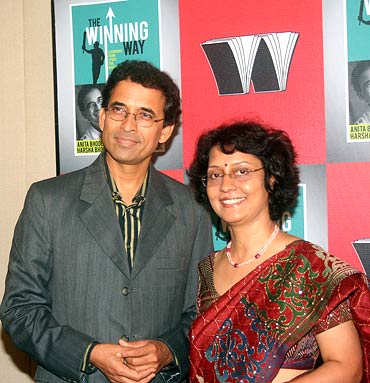
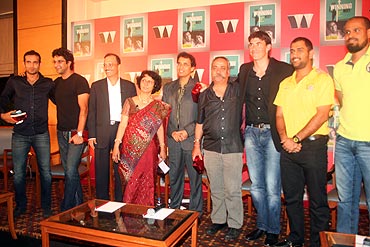
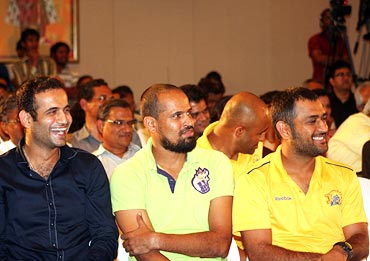
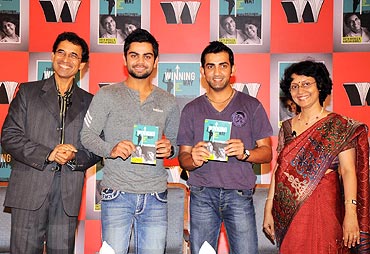
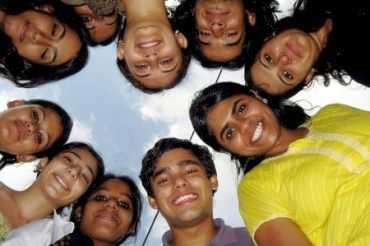
Comment
article